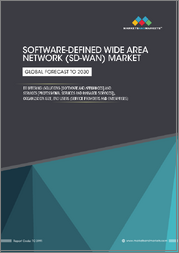
|
시장보고서
상품코드
1530847
SD-WAN 시장 : 컴포넌트별, 도입 형태별, 네트워크 유형별, 조직 규모별, 최종 사용자별, 지역별 분석 예측(-2030년)SD-WAN Market Forecasts to 2030 - Global Analysis By Component (Solution and Service), Deployment Mode (Cloud and On-premises), Network Type, Organization Size, End User and by Geography |
||||||
Stratistics MRC에 따르면 세계의 SD-WAN 시장은 2024년에 74억 5,000만 달러를 차지하고, 2030년에는 358억 1,000만 달러에 이를 것으로 예측되며, 예측 기간 동안 복합 연간 성장률(CAGR)은 29.9%를 나타낼 전망입니다. 기업은 Software-Defined Wide Area Networking(SD-WAN)이라는 최신 네트워킹 기술을 활용하여 광역 네트워크(WAN)를 효과적으로 관리 및 최적화할 수 있습니다. 기존의 와이드 영역 네트워크(WAN)는 주로 MPLS와 같은 특수하고 비용이 많이 드는 하드웨어 기반 연결에 의존하는 것과 달리 SD-WAN은 소프트웨어를 사용하여 광대역 및 LTE 와 같은 여러 전송 서비스 간에 트래픽을 동적으로 라우팅합니다.
MEF(Metro Ethernet Forum)에 따르면 SD-WAN은 동적이고 용도 의식이 있는 네트워크 오버레이이며 다양한 네트워크 전송 유형을 보다 효율적으로 사용할 수 있도록 하고 높은 수준의 보안 그리고 신뢰성을 유지하면서 중요한 애플리케이션에 최적의 성능을 보장합니다.
증가하는 클라우드 채택
기업이 클라우드 기반 서비스 및 용도으로의 전환을 가속화함에 따라 전통적인 광역 네트워크의 한계가 현저해지고 있습니다. 전통적인 WAN은 모든 트래픽을 단일 데이터센터를 통해 라우팅하는 경우가 많기 때문에 지연이 발생하고 클라우드 애플리케이션의 성능이 최적화되지 않습니다. 이를 해결하기 위해 SD-WAN은 지점 수준에서 클라우드에 직접 액세스할 수 있어 대기 시간을 줄여 용도 성능을 향상시킵니다. 또한 SD-WAN은 SaaS(Software as a Service), IaaS(Infrastructure as a Service), PaaS(Platform as a Service)와 같은 클라우드 서비스와의 트래픽을 제어하고 우선순위를 부여할 수 있기 때문에 클라우드 변화를 추진하는 기업에게 중요한 도구입니다.
높은 초기 가격
SD-WAN에 대한 초기 투자는 장기적인 비용 절감 가능성에도 불구하고 고액이 될 수 있습니다. 새로운 하드웨어(예: SD-WAN 어플라이언스) 및 소프트웨어 라이선스를 구입하는 것 외에도 기존 WAN에서 SD-WAN 솔루션으로 전환할 때 새로운 기술을 수용하기 위해 현재 인프라를 업그레이드하는 경우가 자주 필요합니다. 또한 원활한 배포를 보장하기 위해 컨설턴트를 고용하고, IT 직원에게 교육을 제공하고, 관리 서비스 제공업체와 협력함으로써 추가 비용이 발생할 수 있습니다.
5G 네트워크 개발
SD-WAN 시장은 5G 기술이 보다 널리 이용 가능해짐에 따라 상당한 성장이 예상됩니다. 이전 모바일 네트워크 세대에 비해 5G는 훨씬 빠른 데이터 속도, 낮은 지연, 대용량을 약속합니다. 또한 기업은 SD-WAN을 활용하여 5G를 널리 사용할 수 있게 되면서 5G 연결을 WAN 전략에 통합할 수 있습니다. SD-WAN은 다양한 연결 유형으로 트래픽을 지능적으로 라우팅할 수 있으므로 5G의 잠재력을 활용하는 데 이상적이며 기업은 네트워크 성능과 신뢰성을 향상시킬 수 있습니다.
강력한 시장 경쟁
SD-WAN 시장은 더 많은 공급업체들이 시장에 진입하고 다양한 솔루션을 제공함으로써 점점 경쟁이 치열해지고 있습니다. 이 경쟁으로 인한 가격 경쟁은 공급업체의 이익률을 압박할 수 있습니다. 신흥기업도 기존 네트워킹 기업도 항상 제품을 개발,개량하고 있기 때문에 1사가 시장 전체를 장악하는 것은 어렵습니다. 또한 기술 발전 속도가 빠르기 때문에 공급업체는 관련성을 유지하기 위해 지속적인 기술 혁신을 수행해야 하므로 리소스가 압박되고 R&D 비용이 증가할 수 있습니다.
COVID-19의 영향:
COVID-19의 대유행으로 기업은 원격 워크로의 전환을 급속히 진행하고 클라우드 서비스에 대한 의존도를 높여 SD-WAN의 채용이 대폭 가속화되었습니다. 이러한 급격한 변화는 분산된 워크포스에 대응하고 여러 위치에서 회사 리소스에 대한 신뢰할 수 있는 안전한 액세스를 보장하는 데 전통적인 광역 네트워크(WAN)의 단점을 밝혔습니다. 이러한 이유로 많은 기업들이 보안을 유지하고, 성능을 향상시키고, 확장된 네트워크 전체에서 네트워크 유연성을 높이기 위해 SD-WAN을 사용하기 시작했습니다.
멀티 프로토콜 라벨 스위칭 부문이 예측 기간 동안 최대가 될 것으로 예상됩니다.
다중 프로토콜 라벨 스위칭(MPLS) 부문은 SD-WAN 부문에서 가장 큰 시장 점유율을 차지합니다. 많은 비즈니스 용도는 대역폭을 보장하고 지연이 적고 신뢰할 수 있는 고품질 연결을 필요로 하기 때문에 MPLS는 오랫동안 기업 네트워킹의 기초 역할을 해 왔습니다. MPLS는 기업이 SD-WAN을 채택하더라도 네트워크 아키텍처의 중요한 부분으로 남아 있습니다. 또한 MPLS를 광대역 및 LTE 연결과 혼합하는 하이브리드 방식으로 채택되는 경우가 많습니다. 성능과 신뢰성을 보장함으로써 MPLS는 중요한 데이터 트래픽을 관리하기 위한 선호되는 옵션으로 SD-WAN 시장 점유율을 보장합니다.
예측 기간 동안 건강 관리 분야의 복합 연간 성장률(CAGR)이 가장 높아질 전망입니다.
SD-WAN 시장에서는 헬스케어 분야가 가장 높은 복합 연간 성장률(CAGR)을 나타낼 것으로 예측됩니다. 원격 의료, 전자 의료 기록(EHR), 환자 관리에서 사물 인터넷(IoT) 장치의 사용 확대 등을 지원하기 위해 고성능, 신뢰성 및 보안 네트워크 연결에 대한 요구가 증가하고 있기 때문에 건강 관리 분야에서는 SD-WAN의 도입이 급속히 진행되고 있습니다. 의료 제공자는 SD-WAN 덕분에 데이터 프라이버시를 유지하고 HIPAA 규정을 준수하면서 클리닉, 병원, 원격 사무실 등 다양한 장소를 쉽게 연결할 수 있습니다. 게다가, 헬스케어 업계에서 SD-WAN의 급성장은 중요한 용도에 우선순위를 부여하고 일관된 네트워크 성능을 유지하는 능력에 의해 뒷받침되고 있습니다.
최대 점유율을 가진 지역
북미는 SD-WAN의 최대 시장 점유율을 차지하고 있으며, 그 지위는 많은 중요한 요인에 의해 지원됩니다. 이 지역의 최첨단 기술 인프라는 효율성, 보안 및 연결성을 향상시키는 네트워크 솔루션에 대한 강한 확장 요구에 부응하고 있습니다. 미국과 캐나다 조직이 적응성이 높고 저렴한 네트워크 솔루션을 추구하는 것처럼 기업의 디지털 변환 전략 채택률이 높은 것도 중요한 동기 중 하나입니다. 다른 혜택으로 SD-WAN 기술은 북미의 안정적인 경제와 네트워크 근대화에 대한 대규모 투자로부터 이익을 얻고 있습니다.
복합 연간 성장률(CAGR)이 가장 높은 지역:
SD-WAN 시장은 라틴아메리카에서 크게 확대되었으며 복합 연간 성장률(CAGR)의 높이가 현저하게 나타났습니다. 이 증가는 이 지역의 기업들이 디지털 혁신에 대한 노력을 강화하고 있으며, 보다 효과적이고 경제적인 네트워크 솔루션에 대한 수요가 증가하고 있는 것과 관련이 있습니다. 강화된 네트워크 보안과 민첩성에 대한 수요 증가는 인터넷 연결의 확산과 클라우드 컴퓨팅 이용 증가와 같은 여러 요인으로 인해 발생합니다. 게다가 SD-WAN 기술의 급속한 채용은 라틴아메리카의 경제 발전과 IT 인프라 갱신에 대한 투자에 의해 촉진되고 있습니다.
무료 사용자 정의 서비스:
이 보고서를 구독하는 고객은 다음 무료 맞춤설정 옵션 중 하나를 사용할 수 있습니다.
- 기업 프로파일
- 추가 시장 기업의 종합적 프로파일링(3개사까지)
- 주요 기업의 SWOT 분석(3개사까지)
- 지역 세분화
- 고객의 관심에 응한 주요국 시장 추계,예측,복합 연간 성장률(CAGR)(주: 타당성 확인에 따름)
- 경쟁 벤치마킹
- 제품 포트폴리오, 지리적 존재, 전략적 제휴에 기반한 주요 기업 벤치마킹
목차
제1장 주요 요약
제2장 서문
- 개요
- 이해관계자
- 조사 범위
- 조사 방법
- 데이터 마이닝
- 데이터 분석
- 데이터 검증
- 조사 접근
- 조사 정보원
- 1차 조사 정보원
- 2차 조사 정보원
- 전제조건
제3장 시장 동향 분석
- 성장 촉진요인
- 억제요인
- 기회
- 위협
- 최종 사용자 분석
- 신흥 시장
- COVID-19의 영향
제4장 Porter's Five Forces 분석
- 공급기업의 협상력
- 구매자의 협상력
- 대체품의 위협
- 신규 진입업자의 위협
- 경쟁 기업간 경쟁 관계
제5장 세계의 SD-WAN 시장 : 컴포넌트별
- 솔루션
- 소프트웨어
- 가전제품
- 서비스
- 컨설팅
- 실장
- 교육 및 지원
제6장 세계의 SD-WAN 시장 : 도입 형태별
- 클라우드
- 온프레미스
제7장 세계의 SD-WAN 시장 : 네트워크 유형별
- 멀티 프로토콜 라벨 스위칭
- 광대역
- 장기적 진화
- 하이브리드
제8장 세계의 SD-WAN 시장 : 조직 규모별
- 중소기업
- 대기업
제9장 세계의 SD-WAN 시장 : 최종 사용자별
- 은행/금융서비스/보험
- 제조업
- IT 및 통신
- 소매
- 헬스케어
- 정부
- 운송 및 물류
- 에너지 및 유틸리티
- 기타 최종 사용자
제10장 세계의 SD-WAN 시장 : 지역별
- 북미
- 미국
- 캐나다
- 멕시코
- 유럽
- 독일
- 영국
- 이탈리아
- 프랑스
- 스페인
- 기타 유럽
- 아시아태평양
- 일본
- 중국
- 인도
- 호주
- 뉴질랜드
- 한국
- 기타 아시아태평양
- 남미
- 아르헨티나
- 브라질
- 칠레
- 기타 남미
- 중동 및 아프리카
- 사우디아라비아
- 아랍에미리트(UAE)
- 카타르
- 남아프리카
- 기타 중동 및 아프리카
제11장 주요 발전
- 계약/파트너십/협업/합작투자(JV)
- 인수와 합병
- 신제품 발매
- 사업 확대
- 기타 주요 전략
제12장 기업 프로파일링
- Tata Communications
- Palo Alto Networks Inc
- Ericsson
- ZTE Corporation
- NEC Corporation
- FatPipe Networks Inc.
- Aryaka Networks, Inc.
- Epsilon Telecommunications
- Nokia Corporation
- Cisco Systems Inc
- Huawei Technologies Co., Ltd.
- Fortinet Inc
- VMware, Inc
- Dell, Inc
- Oracle Corporation
- Citrix Systems, Inc.
- Versa Networks, Inc.
According to Stratistics MRC, the Global SD-WAN Market is accounted for $7.45 billion in 2024 and is expected to reach $35.81 billion by 2030 growing at a CAGR of 29.9% during the forecast period. Businesses can effectively manage and optimize their wide area networks (WAN) with the help of a contemporary networking technique called software-defined wide area networking, or SD-WAN. In contrast to conventional wide area networks (WANs), which mainly depend on specialized, frequently costly hardware-based connections such as MPLS, SD-WAN uses software to dynamically route traffic across multiple transport services, such as broadband and LTE.
According to the MEF (Metro Ethernet Forum), SD-WAN is a dynamic, application-aware network overlay that allows for more efficient use of different network transport types, ensuring optimal performance for critical applications while maintaining high levels of security and reliability.
Market Dynamics:
Driver:
Rising cloud adoption
The limitations of traditional wide-area networks are becoming more noticeable as organizations accelerate their shift to cloud-based services and applications. Traditional WANs often route all traffic through a single data center, leading to latency and suboptimal performance for cloud apps. In order to solve this, SD-WAN makes direct cloud access possible at the branch level, which lowers latency and boosts application performance. Moreover, SD-WAN is a crucial tool for companies going through cloud transformation because of its capacity to control and prioritize traffic to and from cloud services like SaaS (Software as a Service), IaaS (Infrastructure as a Service), and PaaS (Platform as a Service).
Restraint:
High starting prices
The initial investment in SD-WAN can be high, despite the possibility of long-term cost savings. In addition to buying new hardware (like SD-WAN appliances) and software licenses, upgrading current infrastructure to accommodate the new technology is frequently required when switching from a traditional WAN to an SD-WAN solution. Furthermore, to ensure a seamless deployment, additional expenses may arise from hiring consultants, providing training for IT staff, or collaborating with managed service providers.
Opportunity:
Development of 5G networks
The SD-WAN market is poised for substantial growth as 5G technology becomes more widely available. In comparison to earlier mobile network generations, 5G promises much faster data speeds, lower latency, and greater capacity. Moreover, businesses can utilize SD-WAN to incorporate 5G connectivity into their WAN strategies as 5G becomes more widely available. Due to its capacity to intelligently route traffic across various connection types, SD-WAN is ideally suited to capitalize on 5G's potential, allowing businesses to improve the performance and dependability of their networks.
Threat:
Strong market rivalry
The market for SD-WAN is growing more and more competitive as more suppliers enter the market and provide a variety of solutions. Price wars resulting from this competition could squeeze vendors' profit margins. Since both new and established networking companies are constantly developing and improving their products, it is difficult for one company to control the entire market. Furthermore, vendors need to continuously innovate in order to stay relevant due to the rapid pace of technological advancements, which can put a strain on resources and raise R&D costs.
Covid-19 Impact:
The COVID-19 pandemic caused businesses to quickly shift to remote work and rely more on cloud services, which greatly accelerated the adoption of SD-WAN. The abrupt change brought to light the shortcomings of conventional wide area networks (WANs) in accommodating dispersed workforces and guaranteeing dependable, secure access to company resources from multiple locations. Because of this, a lot of businesses started using SD-WAN to maintain security, boost performance, and increase network flexibility throughout their expanded networks.
The Multiprotocol Label Switching segment is expected to be the largest during the forecast period
The Multiprotocol Label Switching (MPLS) segment holds the largest market share in the SD-WAN segment. Since many business applications require dependable, high-quality connections with guaranteed bandwidth and low latency, MPLS has long served as the foundation of enterprise networking. MPLS continues to be an essential part of network architectures even as enterprises embrace SD-WAN. Furthermore, it is frequently employed in a hybrid approach that blends MPLS with broadband and LTE connections. Due to its performance and dependability guarantees, MPLS is a favored choice for managing important data traffic, which guarantees its market share in SD-WAN.
The Healthcare segment is expected to have the highest CAGR during the forecast period
In the SD-WAN market, the healthcare segment is anticipated to exhibit the highest CAGR. Due to the growing need for high-performance, dependable, and secure network connectivity to support telemedicine, electronic health records (EHRs), and the expanding use of Internet of Things (IoT) devices in patient care, the healthcare sector is quickly implementing SD-WAN. Healthcare providers can connect various locations, including clinics, hospitals, and remote offices, with ease thanks to SD-WAN, all while maintaining data privacy and adhering to HIPAA regulations. Moreover, the rapid growth of SD-WAN in the healthcare industry is fueled by its ability to prioritize critical applications and maintain consistent network performance.
Region with largest share:
North America holds the largest market share for SD-WAN, a position that is supported by a number of important factors. The region's cutting-edge technology infrastructure meets the strong and expanding need for network solutions that improve efficiency, security, and connectivity. One important motivator is the high rates of adoption of digital transformation strategies by businesses, as organizations in the US and Canada is looking for more adaptable and affordable network solutions. Additionally, SD-WAN technologies benefit from North America's stable economy and significant investments in network modernization.
Region with highest CAGR:
The SD-WAN market is expanding significantly in the Latin American region, as evidenced by its noticeably highest CAGR. This increase can be linked to the region's businesses' growing efforts to transform digitally, which is fueling demand for more effective and affordable network solutions. The growth in demand for enhanced network security and agility can be attributed to several factors, including the proliferation of internet connectivity and the increasing use of cloud computing. Furthermore, the rapid adoption of SD-WAN technologies is facilitated by Latin America's economic development and investments in updating IT infrastructure.
Key players in the market
Some of the key players in SD-WAN market include Tata Communications, Palo Alto Networks Inc, Ericsson, ZTE Corporation, NEC Corporation, FatPipe Networks Inc., Aryaka Networks, Inc., Epsilon Telecommunications, Nokia Corporation, Cisco Systems Inc, Huawei Technologies Co., Ltd., Fortinet Inc, VMware, Inc, Dell, Inc, Oracle Corporation, Citrix Systems, Inc and Versa Networks, Inc.
Key Developments:
In July 2024, Ericsson and Oppo have entered a multi-year cross-licensing patent agreement that covers patents related to standards for cellular technologies, including 5G. Per the agreement, the handset vendor will make royalty payments to Ericsson. In addition, the two parties will also cooperate on several 5G-related projects, including device testing, customer engagements and marketing activities.
In May 2024, Palo Alto Networks agreed to acquire IBM's QRadar software as a service assets and intellectual property rights, as part of a broad partnership between the two companies to provide AI-backed cybersecurity to the enterprise market.
In February 2024, Tata Power Co Ltd's shares were up by 1.23 per cent after the company reported that Tata Power Renewable Energy Limited (TPREL), a subsidiary of Tata Power, signed a power delivery agreement (PDA) valued at ₹105 crore with Tata Communications Limited for setting up an 18.75-MW AC group captive solar power plant.
Components Covered:
- Solution
- Service
Deployment Modes Covered:
- Cloud
- On-premises
Network Types Covered:
- Multiprotocol Label Switching
- Broadband
- Long-Term Evolution
- Hybrid
Organization Sizes Covered:
- SMEs
- Large Enterprises
End Users Covered:
- Banking, Financial Services, and Insurance
- Manufacturing
- IT and Telecom
- Retail
- Healthcare
- Government
- Transport and Logistics
- Energy and Utilities
- Other End Users
Regions Covered:
- North America
- US
- Canada
- Mexico
- Europe
- Germany
- UK
- Italy
- France
- Spain
- Rest of Europe
- Asia Pacific
- Japan
- China
- India
- Australia
- New Zealand
- South Korea
- Rest of Asia Pacific
- South America
- Argentina
- Brazil
- Chile
- Rest of South America
- Middle East & Africa
- Saudi Arabia
- UAE
- Qatar
- South Africa
- Rest of Middle East & Africa
What our report offers:
- Market share assessments for the regional and country-level segments
- Strategic recommendations for the new entrants
- Covers Market data for the years 2022, 2023, 2024, 2026, and 2030
- Market Trends (Drivers, Constraints, Opportunities, Threats, Challenges, Investment Opportunities, and recommendations)
- Strategic recommendations in key business segments based on the market estimations
- Competitive landscaping mapping the key common trends
- Company profiling with detailed strategies, financials, and recent developments
- Supply chain trends mapping the latest technological advancements
Free Customization Offerings:
All the customers of this report will be entitled to receive one of the following free customization options:
- Company Profiling
- Comprehensive profiling of additional market players (up to 3)
- SWOT Analysis of key players (up to 3)
- Regional Segmentation
- Market estimations, Forecasts and CAGR of any prominent country as per the client's interest (Note: Depends on feasibility check)
- Competitive Benchmarking
- Benchmarking of key players based on product portfolio, geographical presence, and strategic alliances
Table of Contents
1 Executive Summary
2 Preface
- 2.1 Abstract
- 2.2 Stake Holders
- 2.3 Research Scope
- 2.4 Research Methodology
- 2.4.1 Data Mining
- 2.4.2 Data Analysis
- 2.4.3 Data Validation
- 2.4.4 Research Approach
- 2.5 Research Sources
- 2.5.1 Primary Research Sources
- 2.5.2 Secondary Research Sources
- 2.5.3 Assumptions
3 Market Trend Analysis
- 3.1 Introduction
- 3.2 Drivers
- 3.3 Restraints
- 3.4 Opportunities
- 3.5 Threats
- 3.6 End User Analysis
- 3.7 Emerging Markets
- 3.8 Impact of Covid-19
4 Porters Five Force Analysis
- 4.1 Bargaining power of suppliers
- 4.2 Bargaining power of buyers
- 4.3 Threat of substitutes
- 4.4 Threat of new entrants
- 4.5 Competitive rivalry
5 Global SD-WAN Market, By Component
- 5.1 Introduction
- 5.2 Solution
- 5.2.1 Software
- 5.2.2 Appliances
- 5.3 Service
- 5.3.1 Consulting
- 5.3.2 Implementation
- 5.3.3 Training and Support
6 Global SD-WAN Market, By Deployment Mode
- 6.1 Introduction
- 6.2 Cloud
- 6.3 On-premises
7 Global SD-WAN Market, By Network Type
- 7.1 Introduction
- 7.2 Multiprotocol Label Switching
- 7.3 Broadband
- 7.4 Long-Term Evolution
- 7.5 Hybrid
8 Global SD-WAN Market, By Organization Size
- 8.1 Introduction
- 8.2 SMEs
- 8.3 Large Enterprises
9 Global SD-WAN Market, By End User
- 9.1 Introduction
- 9.2 Banking, Financial Services, and Insurance
- 9.3 Manufacturing
- 9.4 IT and Telecom
- 9.5 Retail
- 9.6 Healthcare
- 9.7 Government
- 9.8 Transport and Logistics
- 9.9 Energy and Utilities
- 9.10 Other End Users
10 Global SD-WAN Market, By Geography
- 10.1 Introduction
- 10.2 North America
- 10.2.1 US
- 10.2.2 Canada
- 10.2.3 Mexico
- 10.3 Europe
- 10.3.1 Germany
- 10.3.2 UK
- 10.3.3 Italy
- 10.3.4 France
- 10.3.5 Spain
- 10.3.6 Rest of Europe
- 10.4 Asia Pacific
- 10.4.1 Japan
- 10.4.2 China
- 10.4.3 India
- 10.4.4 Australia
- 10.4.5 New Zealand
- 10.4.6 South Korea
- 10.4.7 Rest of Asia Pacific
- 10.5 South America
- 10.5.1 Argentina
- 10.5.2 Brazil
- 10.5.3 Chile
- 10.5.4 Rest of South America
- 10.6 Middle East & Africa
- 10.6.1 Saudi Arabia
- 10.6.2 UAE
- 10.6.3 Qatar
- 10.6.4 South Africa
- 10.6.5 Rest of Middle East & Africa
11 Key Developments
- 11.1 Agreements, Partnerships, Collaborations and Joint Ventures
- 11.2 Acquisitions & Mergers
- 11.3 New Product Launch
- 11.4 Expansions
- 11.5 Other Key Strategies
12 Company Profiling
- 12.1 Tata Communications
- 12.2 Palo Alto Networks Inc
- 12.3 Ericsson
- 12.4 ZTE Corporation
- 12.5 NEC Corporation
- 12.6 FatPipe Networks Inc.
- 12.7 Aryaka Networks, Inc.
- 12.8 Epsilon Telecommunications
- 12.9 Nokia Corporation
- 12.10 Cisco Systems Inc
- 12.11 Huawei Technologies Co., Ltd.
- 12.12 Fortinet Inc
- 12.13 VMware, Inc
- 12.14 Dell, Inc
- 12.15 Oracle Corporation
- 12.16 Citrix Systems, Inc.
- 12.17 Versa Networks, Inc.



















